
Menu:
Behrooz Parhami's ECE 1B Course Page for Spring 2023
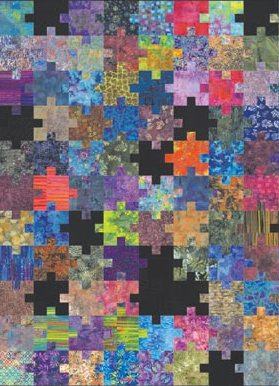
Ten Puzzling Problems in Computer Engineering
Page last updated on 2023 June 14
Note: ECE 1B used to be ECE 1 (see history at the end of this page)
Enrollment code: 11858
Prerequisite: Open to computer engineering students only
Class meetings: M 5:00-6:15, ILP 1203
Instructor: Professor Behrooz Parhami
Office hours: MW 1:00-1:45 PM, Phelps 1431
Course announcements: Listed in reverse chronological order
Grading scheme: Pass/Fail grade is assigned based on attendance
Course calendar: Schedule of lectures and links to lecture slides
The ten lectures: Lecture summaries and references
Additional topics: Possible replacements for current lectures
Attendance record: Please check regularly for possible errors
Miscellaneous information: Motivation, catalog entry, history
Note: The design and goals of this innovative freshman seminar are described in a brief article, a short paper, and a full paper:
- IEEE Computer, Vol. 42, No. 3, Mar. 2009 (PDF file)
- IEEE Trans. Education, Vol. 52, No. 3, Aug. 2009 (PDF file)
- Computer Science Education, Vol. 18, No. 4, Dec. 2008 (PDF file)
Course Announcements
 2023/06/14: The spring 2023 offering of ECE 1B is officially over and grades have been reported to the Registrar. Hope you enjoyed this course. Wishing you a pleasant summer.
2023/06/14: The spring 2023 offering of ECE 1B is officially over and grades have been reported to the Registrar. Hope you enjoyed this course. Wishing you a pleasant summer.
2023/06/05: The finalized attendance record has been posted at the bottom of this page. According to the list, 85 of the 99 students in class already have "Pass" grades, because they had no absence or a single "explained" absence. Nine students (codes 19, 35, 507, 520, 64, 745, 78, 88, 943) are in danger of not passing the class due to having a single unexplained absence. These nine students should contact me ASAP with an explanation. Two students (codes 253, 40) have been assigned "Not Pass" grades due to too many absences. Three students (codes 100, 211, 53) must take an oral final exam late this week, due to having two absences. The latter three students should e-mail me ASAP their time availability on R 6/08 & F 6/09, between 8:00 AM and 7:00 PM, and I will get back to them with a time slot for the oral exam and what it will cover.
2023/05/11: A few discrepancies in the attendance record for Lectures 1-6 have been corrected.
2023/04/10: Attendance record for the first two class sessions (4/03 and 4/10) has been posted at the bottom of this page.
2023/03/30: The first ECE 1B class session will be held on M 4/03 in ILP 1203 (first floor of the just-completed classroom building, to the south of Davidson Library). Please take a quick look at the rest of this Web page to familiarize yourself with the course format and requirements. You can even watch a recorded version of Lecture 1, which you will hear in person on Monday. All of my future communications will be through the "Announcements" section of this Web page. Here are photos of our brand-new classroom, still undergoing finishing touches in preparation for Monday's opening.
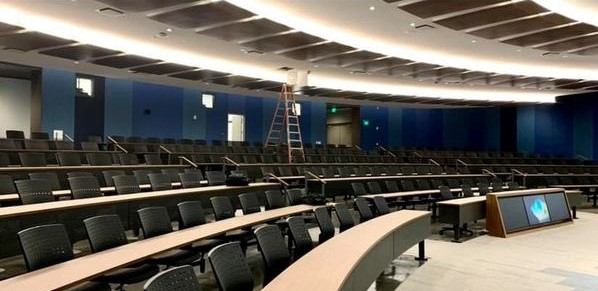
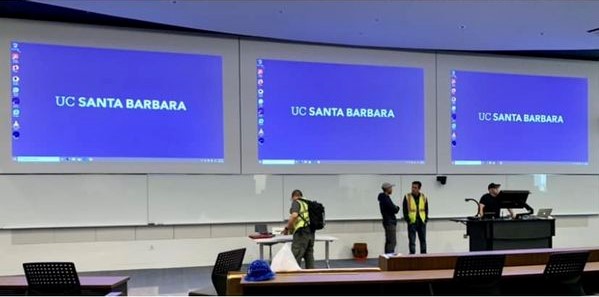
2023/02/16: Welcome to the ECE 1B Web page for spring 2023. We expect to have around 100 students (as of today, enrollment is at 83). Please read the grading scheme very carefully, so you can earn a "pass" grade at the end of the quarter. ECE 1B requires no textbook and has no homework assignments or exams.
[Please report any broken hyperlinks and other problems on this page to the instructor.]
Grading Scheme
Pass/Not-Pass grading is based on attendance* and class participation. There will be no homework or exam.
0 absence: Automatic "Pass."
1 absence: "Pass" if you submit a written statement to explain the absence. Any explanation is acceptable.
2 absences: Can earn a "Pass" grade by taking an oral final exam covering the two missed lectures.
3 or more absences: Automatic "Not-Pass."
Normally, attendance is taken as follows. Attendance slips are distributed at the beginning of each class session, with additional slips supplied to those arriving up to 10 minutes late. Students write their names and perm numbers on the slips and turn them in before leaving the classroom at the end of the lecture. You have to turn in your attendance slip in person, not through another student.
Course Calendar
 Course lectures have been scheduled as follows. PowerPoint presentations (up to 2+ MB), and equivalent PDF files, are updated periodically. Please note that any animation in PowerPoint presentations is lost in the PDF versions.
Course lectures have been scheduled as follows. PowerPoint presentations (up to 2+ MB), and equivalent PDF files, are updated periodically. Please note that any animation in PowerPoint presentations is lost in the PDF versions.
There will be some updating of the slides throughout the quarter, so please pay attention to the "last updated" information shown next to the links for downloading.
Day & Date (Lecture slides ppt+pdf, Lecture video, Last updated) Lecture topic [Lead puzzle]
M 4/03 (ppt, pdf, lecture 1, last updated 2020/03/20) Easy, Hard, Impossible! [Collatz's conjecture]
M 4/10 (ppt, pdf, lecture 2, last updated 2020/04/02) Placement and routing [Houses and utilities]
M 4/17 (ppt, pdf, lecture 3, last updated 2020/04/08) Satisfiability [Making change]
M 4/24 (ppt, pdf, lecture 4, last updated 2020/04/15) Cryptography [Secret messages]
M 5/01 (ppt, pdf, lecture 5, last updated 2020/04/23) Byzantine generals [Liars and truth-tellers]
M 5/08 (ppt, pdf, lecture 6, last updated 2020/04/27) Binary search [Counterfeit coin]
M 5/15 (ppt, pdf, lecture 7, last updated 2020/05/03) Task scheduling [Sudoku]
M 5/22 (ppt, pdf, lecture 8, last updated 2020/05/12) String matching [Word search]
M 5/29 Memorial Day observance: No lecture during spring 2023 (ppt, pdf, lecture (N/A), last updated 2016/05/26) Malfunction diagnosis [Logical reasoning]
M 6/05 (ppt, pdf, lecture 9, last updated 2020/05/19) Sorting networks [Rearranging trains]
F 6/09, 12:00-7:00 PM (Half-hour oral final exams, to be scheduled for those with 2 absences)
W 6/21 (Grades due by midnight)
Summary and References for the Ten Lectures
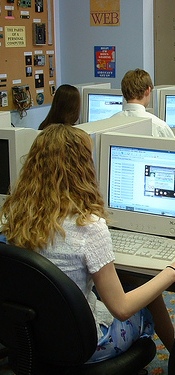
A one-page summary for each of the ten lectures is included in the following paper; additional print and on-line references are given below.
Parhami, B., "A Puzzle-Based Seminar for Computer Engineering Freshmen," Computer Science Education, Vol. 18, No. 4, pp. 1-17, Dec. 2008. (PDF file)
Lecture 1: Easy, Hard, Impossible
Fun with Fibonacci numbers, by Gareth E. Roberts [Seminar slides]
Fibonacci numbers: family trees for bees (BP's Math+Fun page) [Word file]
More on Collatz's conjecture [Wikipedia article]
On the unprovability of Collatz's conjecture, by C. A. Feinstein [Article]
Lecture 2: Placement and Routing
Houses and utilities puzzle [The Math Forum @ Drexel]
Euler's Formula: V – E + F = 2 [Twenty Proofs]
Lecture 3: Satisfiability
Making $5 Using 50 Coins [Ask Dr. Math]
Interactive game, by O. Roussel [The SAT Game]
Lecture 4: Cryptography
Web-based tutorial by P. Gutman [Cryptography and Security]
Web page maintained by T. Sale [The Enigma Cipher Machine]
The Enigma explained [12-minute video]
The fatal flaw in Enigma [11-minute video]
NSA Mathematician David Pery's 65-minute talk on Enigma (cryptography)
Introduction to Cryptography, by John Mason (thebestvpn)
Khan Academy 10-minute video on the Enigma: Part of the module "Journey into Cryptography"
Lecture 5: Byzantine Generals
Saka, P., How to Think About Meaning, Springer, 2007
Resource Web page by A. Montalban and Y. Interian [Liars and Truth-Teller Puzzles] (Link broken?)
Lecture 6: Binary Search
Du, D.-Z., and F.K. Hwang, Combinatorial Group Testing and Its Applications, 2nd ed., World Scientific, 2000 (See Chapter 16, pp. 295-318)
Programs for solving counterfeit-coin problems [Coding resources and hints]
Lecture 7: Task Scheduling
Aaronson, L., "Sudoku Science: A Popular Puzzle Helps Researchers Dig into Deep Math," IEEE Spectrum, Vol. 43, No. 2, pp. 16-17, February 2006
Online Sudoku and other interesting logic puzzles [Logic Games Online]
Lecture 8: String Matching
Website with free online tools for creating word-search and other puzzles [Puzzlemaker]
Lecture 9: Sorting Networks
Hayes, B., "Trains of Thought: Computing with Locomotives and Box Cars Takes a One-Track Mind," American Scientist, Vol. 95, No. 2, pp. 108-113, March-April 2007 [Read on-line]
Parhami, B., Introduction to Parallel Processing: Algorithms and Architectures, Plenum Press, 1999 (See Chapter 7, pp. 129-147, for an introduction to sorting networks)
Lecture 10: Malfunction Diagnosis
Logic problems [Expand Your Mind] (Link broken?)
Somani, A. K., V. K. Agarwal, and D. Avis, "A Generalized Theory for System Level Diagnosis," IEEE Trans. Computers, Vol. 36, No. 5, pp. 538-546, May 1987
Additional Lecture Topics for Possible Future Use
The following additional topics are being considered for inclusion as future lecture topics:
Topic A: Computational Geometry
Puzzles based on visual tricks and optical illusions
Web site devoted to discrete and computational geometry [The Geometry Junkyard]
See lectures 7 and 8 in the fall 2016 offering of the freshman seminar INT 94TN
Topic B: Loss of Precision
Puzzles based on logical paradoxes and absurdities
Parhami, B., Computer Arithmetic: Algorithms and Hardware Designs, Oxford University Press, 2000 (See Problems 1.1-1.3)
Topic C: Secret Sharing
Puzzles based on anonymous complainers and whistle blowers
Shamir, A., "How to Share a Secret," Communications of the ACM, Vol. 22, No. 11, pp. 612-613, 1979
Secret sharing [Wikipedia article]
Topic D: Amdahl's Law
Puzzles on river and bridge crossings
Parhami, B., Computer Architecture: From Microprocessors to Supercomputers, Oxford University Press, 2005 (See Section 4.3)
Amdahl's law [Wikipedia article]
Topic E: Predicting the Future
Puzzles based on determining the next term in a series
Sloane, N.J.A., "Find the Next Term," J. Recreational Mathematics, Vol. 7, No. 2, p. 146, Spring 1974 [GIF]
Sloane, N.J.A., Online Encyclopedia of Integer Sequences [Access on-line]
See lectures 1 and 2 in the fall 2016 offering of the freshman seminar INT 94TN
Topic F: Circuit Value Problem
Puzzles based on parallelization of hopelessly sequential problems
Greenlaw, R., H.J. Hoover, and W.L. Ruzzo, Limits to Parallel Computation: P-Completeness Theory, Oxford University Press, 1995 (See Section 4.2, pp. 75-76)
Topic G: Maps and Graphs
Puzzles based on map/graph coloring and graph properties
Feeman, T.G., Portraits of the Earth: A Mathematician Looks at Maps, American Mathematical Society, 2002
See lectures 9 and 10 in the fall 2016 offering of the freshman seminar INT 94TN
Topic H: Device Variability
Puzzles based on detecting differences in two nearly identical images
Tutorial sources about nanoelectronics device variability and design under variability to be located
Topic I: Cellular Automata
Conway's Game of Life
Wikipedia article on Conway's Game of Life
Martin Gardner's Scientific American article on Conway's Game of Life
Eric Weisstein's Treasure Trove of the Life Cellular Automaton
Topic J: Recommender Systems
Puzzles based on finding similarities or differences among a series of images
Fingerprint matching; Google's page-rank algorithm
Mining massive datasets (YouTube videos) [See in particular video 5.1]
See lectures 3 and 4 in the fall 2016 offering of the freshman seminar INT 94TN
Topic K: 3D Models from 2D Images
Puzzles based on deducing the shapes of 3D objects from 2D projections
3D illudion in 2D drawings (sidewalk art)
Architecrtural visualization; preserving models of historical sites in danger or collapse/destruction;
Modeling industrial parts and assemblies; layered models (3D printing)
See lectures 5 and 6 in the fall 2016 offering of the freshman seminar INT 94TN
Student Attendance Record
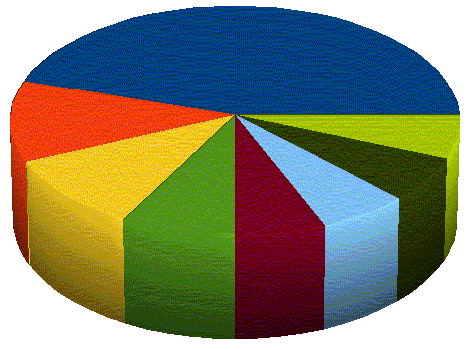
In the following table, absence is marked with a "1" and presense with a "0". The first ten columns correspond to Lectures 1-10, the next column, Σ, is the total number of absences, and "Mrep" is the first few digits of the reversed Perm Number. For example, a student with the Perm Number 9876543 will have a Mrep code of 3, 34, 345, 3456, ... , depending on whether other students have Perm Numbers with the same ending.
For the spring 2023 offering, we return to the use of attendance slips, distributed at the beginning of class session and turned in at the end by each student (returning the slip by another student isn's allowed).
Due to one of our class sessions coinciding with the Memorial Day observance on 5/29, Lecture 10 has been cancelled and attendance will be assessed based only on Lectures 1-9.
1 2 3 4 5 6 7 8 0 9 Σ Mrep Notes about attendance, oral final exam, and grade
0 0 0 0 0 0 0 0 0 0 0 01 Pass
0 0 0 0 0 0 0 0 0 0 0 021 Pass
0 0 0 0 0 0 0 0 0 0 0 024 Pass
0 0 0 0 0 0 0 0 0 0 0 04 Pass
0 0 0 0 0 1 0 1 0 0 2 100 Pass (based on oral final exam on F 6/14)
0 0 0 0 0 0 0 0 0 0 0 106 Pass (but name does not appear on the class list)
0 0 0 0 0 0 0 0 0 0 0 132 Pass
0 0 0 0 0 0 0 0 0 0 0 135 Pass
1 0 0 0 0 0 1 1 0 1 4 153 Not Pass (too many absences)
0 0 0 0 0 0 0 0 0 0 0 154 Pass
0 0 0 0 0 0 0 0 0 1 1 16 Pass
0 0 0 0 0 0 0 0 0 1 1 1774 Pass
0 0 0 0 0 0 0 0 0 0 0 1776 Pass
0 0 0 0 0 0 0 0 0 0 0 180 Pass
0 0 0 0 0 0 0 0 0 0 0 183 Pass
1 0 0 0 0 0 0 0 0 0 1 187 Pass
0 0 0 0 0 0 0 0 0 1 1 19 Pass
0 0 0 0 0 0 0 1 0 1 2 211 Pass (based on oral final exam on F 6/09)
0 0 0 0 0 0 0 0 0 0 0 216 Pass
0 0 0 0 0 1 0 0 0 0 1 217 Pass
0 0 0 0 0 0 0 0 0 0 0 220 Pass
0 0 0 0 0 0 0 0 0 0 0 222 Pass
0 0 0 0 0 0 0 0 0 0 0 244 Pass
0 0 0 0 0 0 0 0 0 1 1 246 Pass
0 0 0 0 0 0 0 0 0 0 0 253 Pass
0 0 0 0 0 0 0 0 0 1 1 256 Pass
0 0 0 0 0 1 0 0 0 0 1 27 Pass
0 0 0 0 0 1 0 0 0 0 1 31 Pass
0 0 0 0 0 0 0 0 0 0 0 320 Pass
0 0 0 0 0 0 0 0 0 0 0 323 Pass
0 0 0 0 1 0 0 0 0 0 1 326 Pass
0 0 0 0 0 0 0 0 0 0 0 327 Pass
0 0 0 1 0 0 0 0 0 0 1 329 Pass
0 0 0 0 0 0 0 0 0 1 1 33 Pass
0 0 0 0 0 1 0 0 0 0 1 35 Pass
0 0 0 0 0 0 0 0 0 0 0 36 Pass
0 0 0 0 0 0 0 0 0 0 0 39 Pass
0 0 0 0 0 1 0 1 0 1 3 40 Not Pass (too many absences; no longer on class list)
0 0 0 0 0 0 0 0 0 0 0 413 Pass
0 0 0 0 0 0 0 0 0 0 0 418 Pass
0 0 0 0 0 0 0 0 0 1 1 4451 Pass
0 1 0 0 0 0 0 0 0 0 1 4455 Pass
1 0 0 0 0 0 0 0 0 0 1 446 Pass
1 0 0 0 0 0 0 0 0 0 1 486 Pass
0 0 0 0 0 0 0 0 0 0 0 487 Pass
0 0 0 0 0 1 0 0 0 0 1 49 Pass
0 0 0 0 0 0 0 0 0 1 1 507 Pass
0 0 0 0 0 0 0 0 0 0 0 5130 Pass
0 0 0 0 0 0 0 0 0 0 0 5131 Pass
0 0 0 0 0 0 0 0 0 1 1 520 Pass
0 0 0 0 0 0 0 0 0 1 1 526 Pass
1 0 0 0 0 1 0 0 0 0 2 53 Pass (based on oral final exam on F 6/14)
0 0 0 0 0 0 0 0 0 0 0 541 Pass
0 0 0 0 0 1 0 0 0 0 1 545 Pass
0 0 0 0 0 0 0 0 0 0 0 55 Pass
0 0 0 0 0 0 0 0 0 0 0 5660 Pass
0 0 0 0 0 0 0 0 0 0 0 5663 Pass
0 0 0 0 0 0 0 0 0 0 0 57 Pass
0 0 0 0 0 0 0 1 0 0 1 58 Pass
0 0 0 0 0 0 0 0 0 0 0 59 Pass
0 0 0 0 0 0 0 1 0 0 1 61 Pass
0 0 0 0 0 0 0 0 0 1 1 624 Pass
0 0 0 0 0 0 0 0 0 0 0 625 Pass
0 0 0 0 0 0 0 0 0 0 0 629 Pass
0 0 0 0 0 0 0 0 0 1 1 63 Pass
0 0 0 0 0 0 0 0 0 1 1 64 Pass
0 0 0 0 0 0 0 0 0 0 0 65 Pass
0 0 0 0 0 0 0 1 0 0 1 67 Pass
0 0 0 0 0 0 0 0 0 0 0 6982 Pass
0 0 0 0 1 0 0 0 0 0 1 6983 Pass
0 0 0 0 0 1 0 0 0 0 1 72 Pass
0 0 0 0 0 0 0 0 0 0 0 73 Pass
0 0 0 1 0 0 0 0 0 0 1 745 Pass
0 0 0 0 0 0 0 1 0 0 1 747 Pass
0 0 0 0 0 0 0 0 0 0 0 76 Pass
0 0 0 0 1 0 0 0 0 0 1 77 Pass
0 0 0 0 0 0 0 0 0 1 1 78 Pass
0 0 0 0 0 0 0 0 0 0 0 793 Pass
0 0 0 0 0 0 1 0 0 0 1 794 Pass
0 0 0 0 0 1 0 0 0 0 1 796 Pass
1 1 1 1 1 1 1 1 0 1 9 80 Not Pass (too many absences)
0 0 0 0 0 0 0 0 0 0 0 820 Pass
0 0 0 0 0 0 0 0 0 0 0 822 Pass
0 0 0 0 0 0 0 0 0 0 0 83 Pass
0 0 0 0 0 0 0 0 0 0 0 85 Pass
0 0 0 0 0 0 0 0 0 0 0 86 Pass
0 0 0 0 0 0 1 0 0 0 1 8751 Pass
0 0 0 0 0 0 0 0 0 0 0 8753 Pass
0 1 0 0 0 0 0 0 0 0 1 8756 Pass
0 0 0 0 0 0 0 0 0 1 1 88 Not Pass (unexplained absence)
0 0 0 0 0 0 0 0 0 0 0 910 Pass
0 0 0 0 0 0 0 0 0 0 0 916 Pass
1 0 0 0 0 0 0 0 0 0 1 921 Pass
0 0 0 0 0 0 0 0 0 0 0 923 Pass
0 0 0 0 0 0 0 0 0 1 1 941 Pass
0 0 0 0 0 0 0 0 0 1 1 943 Pass
0 0 0 0 0 0 0 0 0 0 0 945 Pass
0 0 0 0 0 0 0 0 0 0 0 946 Pass
0 0 0 0 0 0 0 0 0 0 0 95 Pass
0 0 0 0 0 0 0 0 0 0 0 9842 Pass
0 0 0 0 0 1 0 0 0 0 1 9845 Pass
7 3 1 3 4 D 4 9 0 L 65 99 Column totals
Miscellaneous Information
Motivation: Whether they work in the industry or in academic research settings, computer engineers face many challenges in their quest to design or effectively employ faster, smaller, lower-energy, more reliable, and cost-effective systems. Most computer engineering students do not begin tackling such problems, and more generally are not exposed to specific challenges of their field of study, until they enroll in upper-division major courses. Meanwhile, during their freshman- and sophomore-year experiences with foundational courses in mathematics, physics, electrical circuits, and programming, they wonder about where they are headed and what types of problems they will encounter as working professionals. This course is intended to provide an introduction to day-to-day problems and research endeavors in computer engineering via their connections to familiar mathematical and logical puzzles.
Catalog entry: 1B. Ten Puzzling Problems in Computer Engineering. (1) PARHAMI. Seminar, 1 hour.
Prerequisite: Open to computer engineering majors only.
Repeat comments: Not open for credit for those who have taken ECE 1.
Gaining familiarity with, and motivation to study, the field of computer engineering, through puzzle-like problems that represent a range of challenges facing computer engineers in their daily problem-solving efforts and at the frontiers of research.
History: This 1-unit freshman seminar (offered since 2007) was proposed and developed by Professor Parhami. The main goal of the seminar is to expose students to challenging computer engineering problems, faced by practicing engineers and research scientists, in a motivating and entertaining way. The course is useful because CE students have very limited exposure to key concepts in their chosen major during their initial studies that involve mostly foundational, basic science, and general-education courses. Beginning with the AY 2013-2014, the seminar was renamed from ECE 1 to ECE 1B to accommodate another freshman seminar, ECE 1A, that exposes students to a roadmap for their studies at UCSB, their career choices, and leading-edge research topics. During fall 2016 and fall 2018, a similar freshman seminar, INT 94TN, was offered at the campus level to introduce science and technology topics to students from different (non-science/engineering) disciplines.
Offering of ECE 1B in spring 2023
Offering of ECE 1B in spring 2021
Offering of ECE 1B in spring 2020
Offering of ECE 1B in spring 2019
Offering of ECE 1B in spring 2018
Offering of ECE 1B in spring 2017
Offering of ECE 1B in spring 2016 (PDF file)
Offering of ECE 1B in spring 2015 (PDF file)
Offering of ECE 1B in spring 2014 (PDF file)
Offering of ECE 1 in spring 2013 (PDF file)
Offering of ECE 1 in spring 2012 (PDF file)
Offering of ECE 1 in spring 2011 (PDF file)
Offering of ECE 1 in spring 2010 (PDF file)
Offering of ECE 1 in spring 2009 (PDF file)
Offerings of ECE 1 in 2007 and 2008 (PDF file)